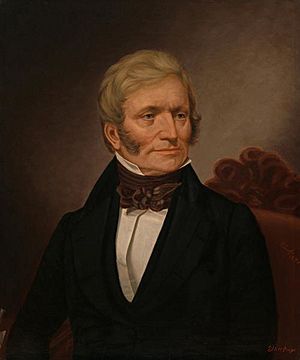John Forsyth (politician) facts for kids
Quick facts for kids
John Forsyth
|
|
|---|---|
 |
|
| 13th United States Secretary of State | |
| In office July 1, 1834 – March 4, 1841 |
|
| President | Andrew Jackson Martin Van Buren |
| Preceded by | Louis McLane |
| Succeeded by | Daniel Webster |
| United States Senator from Georgia |
|
| In office November 9, 1829 – June 27, 1834 |
|
| Preceded by | John M. Berrien |
| Succeeded by | Alfred Cuthbert |
| In office November 23, 1818 – February 17, 1819 |
|
| Preceded by | George Troup |
| Succeeded by | Freeman Walker |
| 33rd Governor of Georgia | |
| In office November 7, 1827 – November 4, 1829 |
|
| Preceded by | George Troup |
| Succeeded by | George Gilmer |
| Member of the U.S. House of Representatives from Georgia's 2nd district |
|
| In office March 4, 1827 – November 7, 1827 |
|
| Preceded by | Constituency reestablished |
| Succeeded by | Richard Henry Wilde |
| Member of the U.S. House of Representatives from Georgia's at-large district |
|
| In office March 4, 1823 – March 3, 1827 |
|
| Preceded by | Robert R. Reid |
| Succeeded by | Districts established |
| In office March 4, 1813 – November 23, 1818 |
|
| Preceded by | Seat established |
| Succeeded by | Robert R. Reid |
| United States Minister to Spain | |
| In office May 18, 1819 – March 2, 1823 |
|
| President | James Monroe |
| Preceded by | George W. Erving |
| Succeeded by | Hugh Nelson |
| 12th Attorney General of Georgia | |
| In office 1808–1811 |
|
| Governor | Jared Irwin David Mitchell |
| Preceded by | John Hamil |
| Succeeded by | Alexander Allen |
| Personal details | |
| Born | October 22, 1780 Fredericksburg, Virginia, U.S. |
| Died | October 21, 1841 (aged 60) Washington D.C., U.S. |
| Political party | Democratic-Republican (before 1825) Democratic (1825–1841) |
| Education | College of New Jersey (BA) (renamed Princeton) |
| Signature | |
John Forsyth Sr. (born October 22, 1780 – died October 21, 1841) was an important American politician from the state of Georgia in the 1800s. He served in both the House of Representatives and the United States Senate. He also became the 33rd Governor of Georgia.
John Forsyth was a strong supporter of President Andrew Jackson. Because of this, Jackson chose him to be the 13th United States Secretary of State in 1834. He continued in this important role until 1841, even serving under President Martin Van Buren. Before that, he was also the U.S. Minister (like an ambassador) to Spain during President James Monroe's time.
Early Life and Education
John Forsyth was born in Fredericksburg, Virginia. His father, Robert Forsyth, was an immigrant from Scotland. Sadly, his father was the first U.S. Marshal to be killed while on duty, which happened in 1794.
John Forsyth became a lawyer. He studied at the College of New Jersey, which is now known as Princeton University. He graduated in 1799. Around 1801 or 1802, he married Clara Meigs. Her father was Josiah Meigs. One of John Forsyth's sons, John Forsyth, Jr., later became a newspaper editor.
A Life in Politics
John Forsyth had a long and busy career in American politics. He served in the United States House of Representatives twice, from 1813 to 1818 and again from 1823 to 1827. He was also a member of the United States Senate from 1818 to 1819 and from 1829 to 1834.
From 1827 to 1829, he was the 33rd Governor of Georgia. His most well-known role was as the United States Secretary of State, serving from 1834 until 1841. In this job, he was in charge of the government's response to a famous legal case called the Amistad case. This case involved enslaved Africans who rebelled on a ship.
Forsyth was a very loyal supporter of President Andrew Jackson. He disagreed with John C. Calhoun during the Nullification Crisis. This was a time when some states believed they could ignore federal laws they didn't like. Forsyth was rewarded for his support by being appointed Secretary of State. He also supported the Indian Removal Act of 1830, which led to the forced removal of Native American tribes from their lands. It is also important to note that he supported slavery and was a slaveholder himself.
Death and Legacy
John Forsyth passed away in Washington, D.C., on October 21, 1841, just one day before his 61st birthday. He was buried in the Congressional Cemetery.
Several places in Georgia are named after him. These include Forsyth County, Georgia, the city of Forsyth, Georgia, and Forsyth Park in Savannah.
In Popular Culture
- In the 1997 movie Amistad, directed by Steven Spielberg, the character of John Forsyth was played by actor David Paymer.
See also
 In Spanish: John Forsyth para niños
In Spanish: John Forsyth para niños

